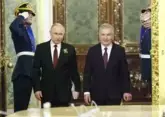Ikhtiyor Abdullaev left the State Security Service (SSS) of Uzbekistan on February 11, one year after having been appointed to head the powerful internal security force. The presidential decree regarding Abdullaev’s departure asserts that the reason for him stepping down was linked to having undergone two complex spinal surgeries in the past year. Jamestown Foundation reports in its article Head of Uzbekistan’s Powerful Security Service Dismissed After One Year in Job that allegations of health problems routinely obscure the real motive behind important personnel reshuffles in this Central Asian republic.
One source claims that Abdullaev, his deputy, and several agency personnel are suspects in a criminal case (Ozodlik, February 13). Abdullaev, who until recently was seen as deeply loyal to President Shavkat Mirziyaev, has now joined a growing group of high-profile officials elevated and later purged by Uzbekistan’s current head of state.
Abdullaev’s one-year tenure is strikingly short, especially compared to that of his predecessor Rustam Inoyatov’s 22 years at the head of the SSS. Nonetheless, their respective fallouts with Mirziyaev started similarly. Abdullaev’s demotion reportedly came a month after the arrest of his deputy, Jahongir Egamov, and dozens of other SSS personnel for allegedly establishing surveillance and wiretapping operations targeting the presidential family (BBC-Uzbek service, February 11; Ozodlik, February 13). According to the latest information, Abdullaev has been temporarily incarcerated as a suspect in a case involving bribery and abuse of power—accusations based on Egamov’s testimony (Ozodlik, February 13).
Abdullaev’s tenue as the SSS’s top official began on January 31, 2018, five weeks after President Mirziyaev’s scathing review of the agency (then called National Security Service) at his first state-of-the-nation address in December 2017 (see EDM, February 8, 2018). Before that, he worked for three years as a prosecutor general. Indeed, in early 2015, Mirziyaev—then the prime minister—personally announced and introduced Abdullaev to the Prosecutor General’s Office at a special meeting (Gazeta.uz, April 21, 2015). Abdullaev also served as a state advisor on staffing matters for the previous administration (of Islam Karimov), from 2009 to 2015; and during that tenure, he was appointed a senator to the national legislature (Gazeta.uz, February 11, 2019; Podrobno.uz, January 22, 2015).
Mirziyaev clearly profoundly trusted Abdullaev, considering the latter man an ally in his quest to support entrepreneurial individuals to help transform the country’s economy. In February 2017, the Uzbekistani leader appointed then–prosecutor general Abdullaev to head an interagency commission on fighting corruption (Podrobno.uz, February 6, 2017). And in one of his most passionate addresses in the Ferghana region, President Mirziyaev contrasted then–prosecutor general Abdullaev with his “corrupt” predecessor, Rashid Kadirov (currently on trial), underlining the honest work Abdullaev was doing and calling on Ferghana’s local prosecutor to assist in his endeavors (Kun.uz, November 27, 2017).
Undoubtedly, Mirziyaev’s appointment of Abdullaev to head the SSS was intended to reform the agency by reigning in its near-limitless power, which had expanded under Rustam Inoyatov. Yet, it seems the agency transformed him instead. From a reformist ally, he turned into a reactionary hawk. On March 29, 2018, in his only address to the legislative body as the SSS head, Abdullaev presented an extensive and seemingly spurious list of external and domestic threats. According to his account, the country’s external threats included “suspicious investors and tourists” attracted to Uzbekistan because of its opening up to the world; returning militants who had fought abroad for the Islamic State, the Taliban and the Turkistan Islamic Movement; as well as increased attempts to smuggle religious-extremist literature, illegal drugs, and weapons into Uzbekistan. He also spoke about separatist forces financed by foreign special services. According to Abdullaev, domestic threats included the abuse of religious freedoms recently extended to the population, such as allowing Salafist-friendly individuals to be able to grow beards (Kun.uz, March 30, 2018).
Domestic civil society organizations now claim Abdullaev has become an opponent to Mirziyaev’s reforms (BBC-Uzbek service, February 11). Not only did Abdullaev fail to initiate any changes inside the SSS, but reportedly he was also implicated in backtracking on domestic media freedoms as of mid-2018 (BBC-Uzbek service, February 20, 2019and October 25, 2018; Gazeta.uz, December 29, 2018). Those cases included surveillance of independent journalists in Uzbekistan and blocking YouTube, Facebook, and VKontakte social media applications. No publicly available evidence currently exists to implicate Abdullaev directly in such backtracking on civic freedoms, but the SSS is notably the only domestic agency with control over social media and internal surveillance. Moreover, access was restored to these blocked social media sites one week after Abdullaev’s removal—likely not a coincidence (Podrobno.uz, February 22).
In appointing Abdullaev to head and reform Uzbekistan’s most powerful security organization, Mirziyaev was clearly placing high trust in his subordinate. Abdullaev’s tenure as prosecutor general prior to leading the SSS illustrated his close alliance with the president. But something or someone must have transformed Abdullaev soon after he took over as head of the SSS, contributing to his hawkishness and sudden preoccupation with isolated or dubious threats. Consequently, over the past year, he not only apparently failed to reform the SSS, allowing previous extra-judicial activities such as wiretapping and illegal surveillance to continue, but became an obstructive force himself.










